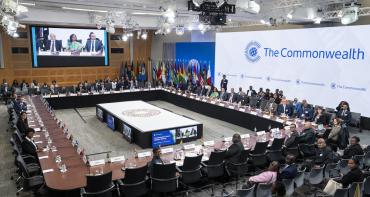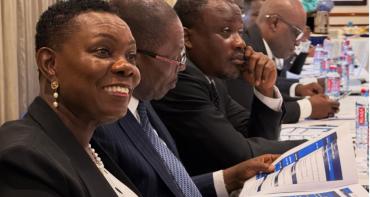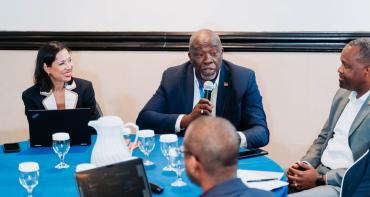Canadian television station TVO yesterday broadcast a special edition of its flagship talk show, The Agenda with Steve Paikin, focused on the Commonwealth of Nations: its purpose, past and future.
Canadian television station TVO yesterday broadcast a special edition of its flagship talk show, The Agenda with Steve Paikin, focused on the Commonwealth of Nations: its purpose, past and future.
Headlined ‘The Commonwealth: Redux?’, the programme featured Deputy Secretary-General Deodat Maharaj as a special guest, alongside a panel of experts and academics.
The show examined the influence of large and small nations in the Commonwealth, its commitment to shared principles and values such as democracy and human rights, and opportunities for trade and growth.
Mr Maharaj described the Commonwealth as a “modern and progressive family of nations working together in a time of considerable uncertainty to lend stability and be an exemplar” which helps countries to grow and prosper.
Citing research from the Commonwealth Secretariat which shows it is on average 19 per cent cheaper for Commonwealth countries to trade with each another than with non-member countries, Mr Maharaj expressed optimism that this “Commonwealth trade advantage” could rise to even 30-35 per cent in the coming years.
“We expect that intra Commonwealth trade will increase to US$1 trillion by 2020 and by 2030 to increase to a phenomenal US$2.75 trillion,” he said.
The Commonwealth is an association in which all countries have equal say, but in which small and developing countries, making up a majority of the membership, have significant influence, commented Stephen Rockel, Associate Professor in African History at the University of Toronto. “Developing countries are sitting side by side with the very rich countries,” he said.
“At crucial parts in the Commonwealth’s history the smaller nations have had a very big influence. For example around the establishment of the Secretariat in 1965, some of the smaller African countries had a very big role in that; or for example the Commonwealth’s role in the anti-apartheid movement.”
Francine McKenzie, Professor of History at Western University, Ontario, said, “The Commonwealth today has defined itself as the antithesis of what the [British] Empire used to be, for example it focuses on the interests of small nations and it’s definitely committed to things like democracy and peace and soft power issues.”
“What makes the Commonwealth special is that we are a family of nations where a country the size of Nauru with 10,000 people... will sit at the table on an equal footing with a G20 country like the UK, or Canada, or a country like India with a population of 1.3 billion,” added Mr Maharaj.
Responding to a question from the host of the show, veteran broadcaster Steve Paikin, about Canada’s role in the Commonwealth, Mr Maharaj noted that it “continues to play a very important global leadership role and provides much needed resources to advance the work of the Commonwealth in the Caribbean, in the Pacific, in Africa, in Asia and elsewhere.
“There are immense opportunities for Canada, for the Caribbean, for Africa, for Asian countries and indeed the UK going forward and we should all seize and take advantage of those opportunities,” he said.



